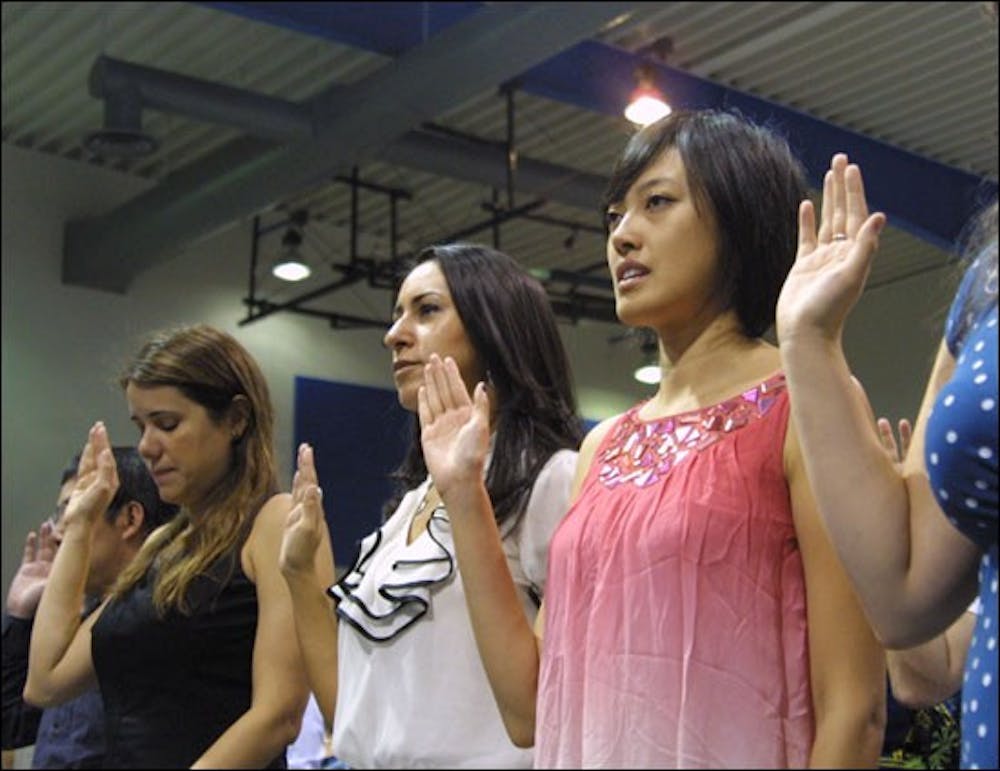Coming one day after President Barack Obama called on Congress to reform the country’s “broken” immigration system, immigrants from 55 different countries gathered inside a gymnasium at South Mountain Community College Friday.
One hundred and ninety new citizens waved miniature American flags, celebrating their new status during the 22nd Annual Fiesta of Independence naturalization ceremony.
Araceli Mena, a business management senior, took part in the ceremony. A resident of Mexico City for most of her life, she moved to the U.S. when she was 19.
Mena, 24, had to wait five years to become a U.S. citizen after arriving.
Her father is also a citizen, but her sisters have been waiting in Mexico for almost seven years to receive resident visas.
The visa process is long and difficult, Mena said, and that might be a factor in illegal immigration.
“I think [people immigrate illegally] because it’s so hard to actually do it the right way if you don’t have any family members that can actually apply for you and get you here,” she said.
Mena waited two years to receive her green card, a process that cost about $2,000, she said.
Those who are attempting to legally become citizens should have first priority, she said.
“It’s ridiculous…how long you have to wait to just get a green card when you’re doing everything right,” Mena said.
She said she supports the proposed Development, Relief and Education for Alien Minors (DREAM) Act, which is supported by ASU President Michael Crow.
The act, recently in the form of Senate Bill 729, would allow undocumented students to stay in the U.S. to pursue a college education if they meet certain requirements.
Students would have to be younger than 16 when they entered the country and not older than 35, live continuously in the U.S. for at least five years, have good moral character and be accepted at a higher education institution or complete a high school-level education.
A letter sent by Crow and other university presidents to U.S. senators in May states that revised policies could provide those students with access to higher education.
“The undocumented high school graduates who are qualified to attend college have been waiting now for many years for federal immigration policy to be revised...,” the letter states. "And further delay is unacceptable."
Mena said that most of the students who are here illegally probably came to the U.S. when they were 2 or 3 years old and didn’t realize what their parents were doing.
“People that are studying and they’re going to school…those are the people that I believe should have the right to become U.S. citizens,” Mena said.
Mena plans on staying in the U.S. after college and has a promising full-time job.
“Here I have the opportunity to do everything that I want,” Mena said.
Munzir Ahmed, a psychology junior, came from Sudan in 2000 for a better education.
The U.S. was founded by immigrants, he said, and the government should allow illegal immigrants to gain citizenship.
“Some of them, they don’t even have a chance to come over here, so they’ve got to do it illegally,” Ahmed said. Illegal immigrants also deserve higher education, he said.
“There’s a lot of smart people in different areas of the world, and a lot of them, they don’t have a chance to get higher education,” Ahmed said.
Xiao Ping Li, a May biochemistry graduate, said she moved to the U.S. about six years ago from China.
Li moved with her parents for a better education and environment.
“The life here is really slow,” Li said, whereas in China, people focus on their work and live in a fast-paced environment. “[People in Arizona] just enjoy their lives.”
It was difficult to adapt to her new country during high school, she said, because most students had been friends with each other for a while.
College was a better fit for her, she said.
“People are from all over the place,” Li said.
Now she is in the process of applying for medical school and wants to be a doctor so she can help her family with their health problems.
She said she doesn’t approve of immigrants who come to the U.S. illegally, and is against granting illegal immigrants amnesty.
“It is not fair for us, [because] we paid a lot of money and we spent a lot of time on the paperwork,” Li said.
She said that students don’t need to come here illegally, because they can apply for visas.
“It’s just not really that hard…as long as you follow procedures,” Li said.
Friday’s naturalization ceremony is required to complete the citizenship process and involves taking an oath, said Charles Harrell, the branch chief for the Phoenix Field Office of the U.S. Citizenship and Immigration Services.
There are usually two naturalization ceremonies every Friday at state courts, he said, but the Fiesta of Independence ceremony at South Mountain Community College is one of the biggest.
“It’s become kind of a traditional thing,” Harrell said.
The ceremony was sponsored by South Mountain Community College and administered by the U.S. Citizenship and Immigration Services.
Since January, 5,230 immigrants have become citizens in Arizona.
Reach the reporter at reweaver@asu.edu





